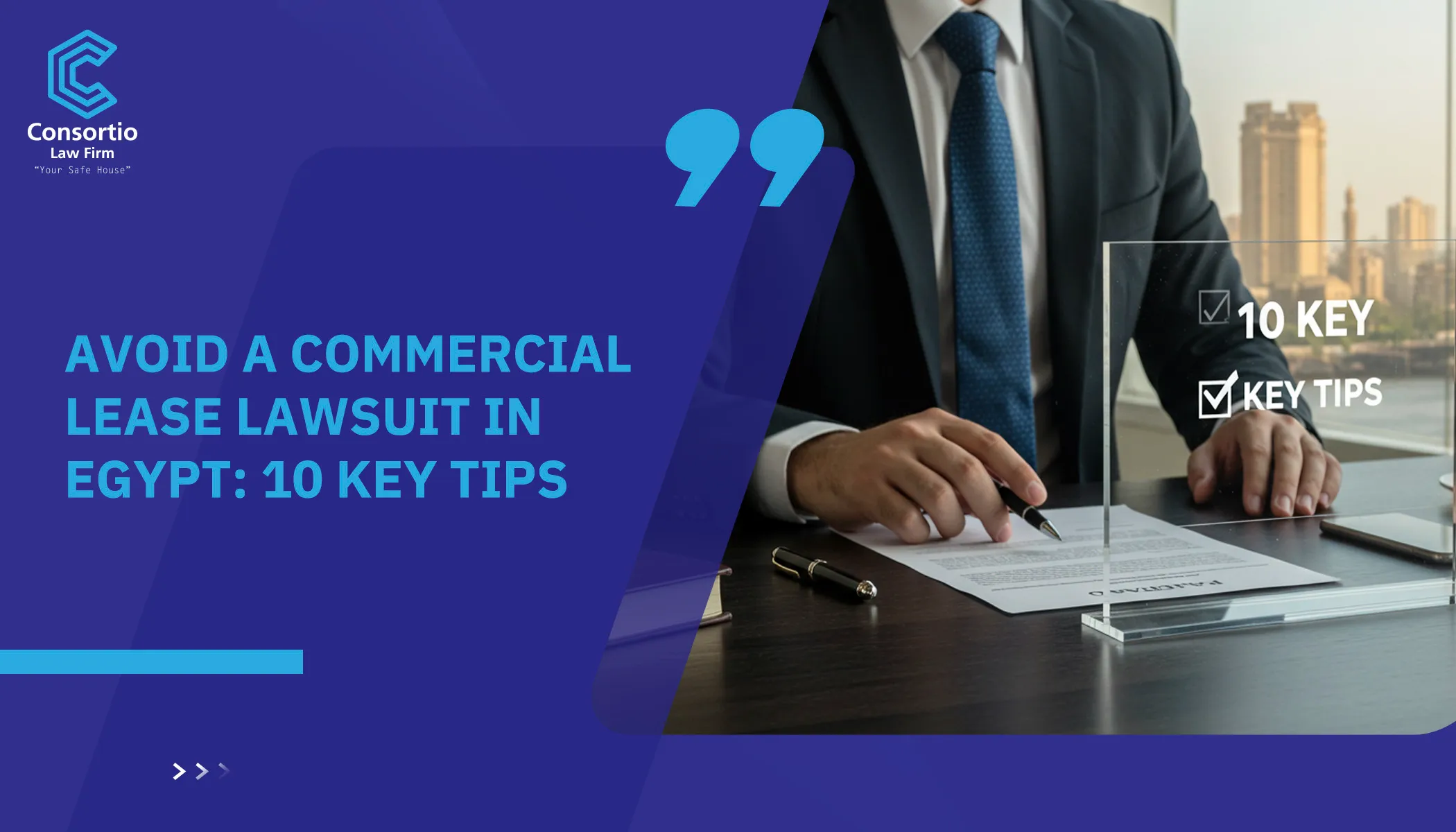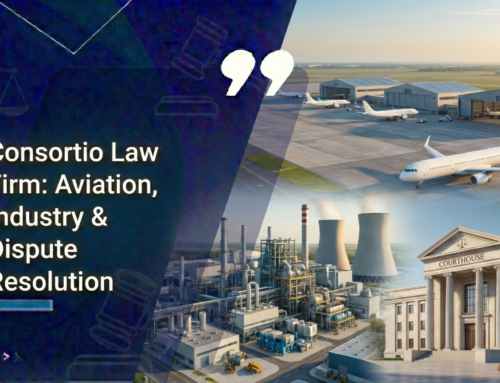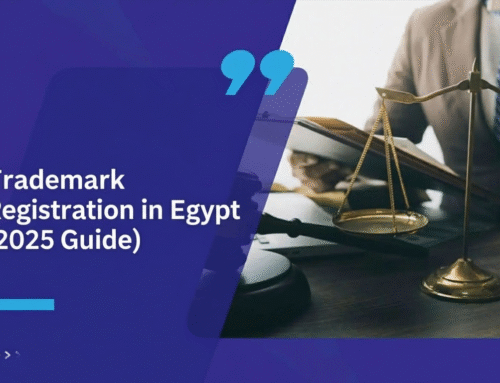In Egypt’s thriving commercial landscape, leasing property isn’t just a transaction, it’s a cornerstone of business growth. But what happens when disputes arise and a lawsuit lands on your desk? Panic? Not if you’re prepared. A Commercial Lease Lawsuit in Egypt can feel like a legal labyrinth, threatening not only your property rights but also your business stability. Yet, within every legal challenge lies a strategic opportunity.
Whether you’re a landlord safeguarding your investment or a tenant protecting your operations, understanding the nuances of Egypt’s commercial lease laws is the first step toward reclaiming control and powering forward with confidence.
Understanding the Commercial Lease Laws in Egypt
A commercial lease is a legally binding contract between a landlord and a tenant for the rental of business property (such as office space, retail storefronts or warehouses).
In Egypt, commercial lease agreements are primarily regulated by the Egyptian Civil Code (Law No. 131 of 1948), with significant amendments introduced under (Law No. 4 of 1996), which liberalized lease terms and rent controls for agreements signed after its enactment.
These reforms have allowed greater flexibility in determining rent, duration and other key terms, making the Egyptian market more attractive to commercial tenants for both local and foreign investors.
There are key provisions in a commercial lease, including:
- Lease duration.
- Rent value and escalation clauses.
- Maintenance and utilities responsibilities.
- Registration terms.
- Legal proceedings of eviction and termination.
These clauses must be carefully negotiated and explicitly written.
Hence, understanding this legal framework governing commercial leases in Egypt is essential for both landlords and tenants seeking to establish or expand business operations within the country.
Common Causes of Commercial Lease Disputes
Commercial lease disputes in Egypt often arise when either party fails to meet their contractual obligations or when lease terms are unclear or contested. These disputes can lead to financial loss, business disruption and lengthy legal battles.
Below are some of the most common causes:
-
Non-Payment of Rent
Failure by the tenant to pay rent on time or in full is one of the most frequent sources of disputes. Issues may also arise over late payment penalties or disagreements about rent increases.
-
Lease Termination and Eviction
Disputes often occur when one party seeks to terminate the lease early or when the landlord attempts to evict the tenant for cause (e.g., non-payment, misuse of the property).
If termination clauses are vague or not legally enforceable, conflicts escalate.
-
Rent Escalation Disagreements
While many leases include annual rent increases, disputes can arise over the method of calculation, percentage increase or timing, especially when contracts are not explicit.
-
Maintenance and Repair Responsibilities
Arguments may occur over who is responsible for maintaining the premises. Tenants and landlords may disagree on what constitutes “major” vs. “minor” repairs or who should cover specific costs.
-
Subletting or Unauthorized Use
Tenants subletting without landlord approval or using the premises for unauthorized purposes (e.g., operating a different type of business than agreed) is a common cause of dispute.
-
Property Modifications or Renovations
Making structural changes or renovations without consent from the landlord can result in conflict, particularly if the alterations impact the property’s value or violate zoning laws.
-
Deposit Refunds
At the end of the lease, disagreements may arise over whether the security deposit should be refunded, often tied to disputes over property damage or unpaid rent.
-
Ambiguities in Contract Terms
Poorly drafted lease agreements with vague language around renewal, rent review or usage rights can lead to differing interpretations and legal conflict.
-
Breach of Contract
Any violation of terms, whether by the tenant (e.g., overcrowding, noise complaints) or landlord (e.g., failure to provide access or services), can trigger formal disputes.
-
Legal and Regulatory Non-Compliance
Disputes may also arise if the lease violates zoning regulations, local licensing rules or fails to meet registration or tax obligations.
How to File a Commercial Lease Lawsuit in Egypt?
Filing a commercial lease lawsuit in Egypt involves several legal steps, whether you’re a landlord seeking eviction or unpaid rent or a tenant seeking damages or enforcement of rights.
Here’s a clear and practical guide that outlines the legal steps involved in pursuing legal lawsuit in the event of a commercial lease dispute:
-
Understand the Nature of the Dispute
Before filing, clearly identify:
- What lease clause was breached?
- Are you seeking damages, eviction, or injunctive relief?
- Have you attempted negotiation or mediation?
- Do you have proof (emails, photos, invoices, lease terms)?
-
Review the Lease Agreement
Before initiating legal action, you must:
- Check for a dispute resolution clause (e.g., arbitration or court jurisdiction).
- Ensure the breach is well documented (non-payment, contract violation, etc.).
- Gather all relevant evidence: Lease contract, payment receipts, correspondence, notices, etc.
-
Hire a Commercial Real Estate Attorney
Commercial leases are complex. An attorney can:
- Evaluate your case.
- Draft or respond to a demand letter.
- File the proper court documents.
- Represent you in court or settlement negotiations.
-
Send a Formal Legal Notice
A formal warning is typically required before filing a lawsuit:
- Sent via a lawyer, a public notary “court” or registered mail.
- States your claims, what you want, and a deadline to resolve.
- Gives the other party time to rectify the breach (usually 15–30 days).
- Shows the court you attempted to resolve it before filing.
This notice is often required by judges to show good faith.
-
Choose the Appropriate Court
Businesses and investors with expert lawyers must choose the appropriate court related to their disputes, such as:
- Appeal Courts for urgent matters like eviction.
- Civil Courts for higher-value or complex claims.
- Commercial Departments in civil courts may handle large-scale lease disputes.
Jurisdiction is generally based on the location of the property or the domicile of the defendant.
-
File the Lawsuit (Statement of Claim)
Submit a statement of claim to the competent court. It must include:
- Details of the parties.
- Description of the lease and alleged breach.
- Legal basis for the claim.
- Specific remedies sought (e.g., eviction, payment, compensation).
- Supporting documents.
Filing fees apply and are based on the value of the claim.
-
Court Proceedings
This process include:
- The defendant is notified and given time to respond.
- Both parties present arguments and evidence.
- The judge may order an expert report in technical disputes (e.g., rent valuation, damage assessments).
Legal representation is highly recommended, especially for non-Arabic speakers or foreign entities.
-
Judgment and Enforcement
If the court rules in your favor, a final judgment is issued, so that:
- Enforcement (e.g., eviction, asset seizure) is done through the Execution Department of the court.
- Appeals may be possible, depending on the case and court level.
Note: There are key considerations, include:
- Language: All court documents must be in Arabic.
- Legal Costs: Filing fees, attorney fees, and potential expert fees should be factored in.
- Timeframe: Court proceedings can be slow, 6 months to several years depending on complexity.
- Legal Advice: Always consult with a qualified Egyptian lawyer before filing.
How to Avoid Commercial Lease Lawsuits in Egypt?
A commercial lease in Egypt is more than a contract, it’s the foundation of your operations, your vision and your future. So, when disputes arise, they can shake more than just the balance sheet.
Thus, avoiding commercial lease lawsuits in Egypt, where legal proceedings can be time-consuming and costly, requires a proactive, well-informed approach, including:
- Write a clear lease with detailed terms for rent, duration, and responsibilities.
- Confirm property ownership and make sure the location suits your business legally.
- Register leases to protect your legal rights.
- Use written communication for payments, notices, and important discussions.
- Agree in advance on rent increases and how lease renewals will be handled.
- Add a clear clause for resolving disputes through court or arbitration.
- Schedule regular inspections and document the property’s condition.
- Follow the lease terms exactly to avoid legal breaches.
- Avoid vague language in contracts that can be misinterpreted later.
- Speak to an expert lawyer as soon as a problem starts.
Commercial lease lawsuit can significantly impact both landlords and tenants, especially when issues arise around rent, maintenance obligations or contract violations. Timely and effective resolution is essential to safeguarding your business interests.
With “Consortio Law Firm” by your side, you benefit from seasoned legal experts, tailored conflict resolution strategies and a deep understanding of Egypt’s real estate legal framework.
Our experienced team is dedicated to providing you with expert legal advice, effective negotiation and strong representation to resolve conflicts swiftly and ensure the best possible outcome for your business.
Whether you’re a landlord or a tenant, the key isn’t to avoid the storm, it’s learning how to navigate it.
Contact us Today and schedule your consultation via:
Phone number: 002-01028806061.
Via: WhatsApp.
Email: Info@consortiolawfirm.com.
FAQ’s
-
What is a commercial lease lawsuit?
A legal dispute between a landlord and a tenant over the terms or enforcement of a commercial lease.
-
What is the most common cause for breaching a commercial lease?
Failing to pay rent as agreed in the lease. Late or missed payments often lead to disputes and are a primary reason landlords take legal action.
-
What damages can be claimed in a commercial lease lawsuit?
Unpaid rent, repair costs, attorney fees and sometimes lost profits.
-
What is the most common penalty for breaking a commercial lease?
Being required to pay damages, usually including the remaining rent due for the lease term or a fixed penalty specified in the contract. Landlords may also keep the security deposit or seek eviction.
-
Are lease renewals automatic in Egypt?
Lease renewals depend on the contract terms and applicable laws; some laws limit duration or increase rent on renewal.
-
Is legal representation recommended?
Yes, lawyers help protect your rights and navigate complex commercial laws. “Consortio Law Firm” is the most recommended choice.





